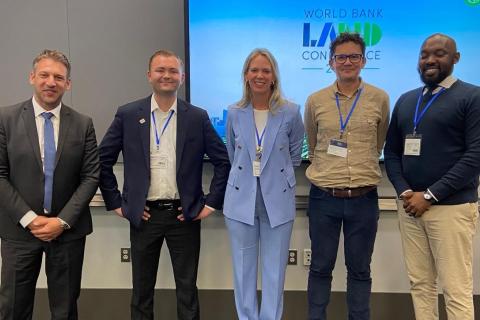Revisiting Chicoral: Colombia’s Sandwich Strategy for Land Reform, Then and Now
Image: Poster “For Peace with Social and Environmental Justice — Turning the Chicoral Pact Around" by Luis Baquero
In February 2025, over 5,000 peasant, Indigenous, and Afro-descendant leaders gathered in Chicoral, Tolima – a small town in the plains of an Andean valley in Colombia. Today, it is known as an agricultural production hub, but in 1972, it became infamous as the site where political and landowning elites struck a deal to shut down agrarian reform – entrenching land inequality and silencing the voices of the rural poor for generations.
Erased: Why Land Rights for Women in the Global South Are Missing from the UN’s Agenda
Rethinking Land Security as a Verb
Banner Image Credits: Photo by Ashwini Chaudhary(Monty) on Unsplash | Free to use under the Unsplash License
Beyond land tenure, youth land rights fosters socioeconomic development
Africa is the youngest continent in the world, with a median age of around 20. This rising generation of youth presents an enormous opportunity for socio-economic development. But for Africa’s young people to unlock their full potential, they need full enjoyment of land rights – a cornerstone for economic opportunity and social empowerment.
Tenure insecurity on the rise: 1.1 billion people at risk, Prindex report warns
At the Rome launch of the Global Comparative Report on Security of Property Rights for Land and Housing in 2024 presented by Prindex initiative on October 22, alarming new data revealed that 1.1 billion people worldwide feel insecure about their property rights, reflecting an escalating global crisis in housing and land tenure. The findings, derived from Prindex data, present a worrying increase from 19% of the adult population in the surveyed 108 countries in 2020 to 23% in 2024—meaning almost one in four adults now fear losing their homes or land.
India's Urgent Need for Clarity on Land Issues: The Role of the India Land and Development Conference
Navigating Malawi's Land Laws: Unravelling Colonial Legacies and Customary Challenges
The article examines the challenges in Malawi's land governance, tracing issues back to colonial legacies and addressing contemporary problems in customary land practices. Despite amendments to incorporate indigenous people and customary laws, challenges persist, particularly in ownership claims tied to prevailing customary law in which marriage systems play a central role. The journey towards reform began in 1996, resulting in the Malawi National Land Policy in 2002, aiming for tenure security and sustainable land use. The Customary Land Act (amended) of 2022 faces challenges, including potential land grabs by wealthy Malawians. Women and children's rights in land ownership are often overlooked, with discriminatory practices persisting. Striking a balance between decolonisation and cultural preservation is crucial for achieving social justice in land laws.
Towards a Global Land Agenda: Shaping the Future of Land Governance
In a world grappling with numerous challenges related to climate change, socio-economic issues, and migration, the significance of land cannot be overstated. Land is not just a concern for the land community but for all communities, as it holds the potential to address critical global issues. Recognizing the need for a comprehensive approach to land governance, a global land agenda is being proposed. This blog explores the origins, objectives, and actions required to pave the way for effective land governance on a global scale.
Civil society organizations are key to creating better land policies: lessons from Zambia
In a blog series from IIED and the Land Portal, rights defenders and practitioners in the global South reflect on their strategies to push for more responsible and sustainable land-based investments. Here, guest blogger Jesinta Kunda describes how civil society organizations were key to improving Zambia’s first ever National Lands Policy.
Scaling – Definition, strategies and challenges to inform a learning agenda
Scaling is at the heart of both the name as well as the strategy of LAND-at-scale (LAS). Scaling and scaling potential are key in the way the program was designed and is reflected in the three pillars chosen to realize the aim of the program. The first pillar is about scaling successful initiatives and projects; the second pillar focuses on land governance innovations with scaling potential; and the third pillar covers knowledge management, with a focus on gaining a deeper understanding on the conditions required to make scaling successful.











